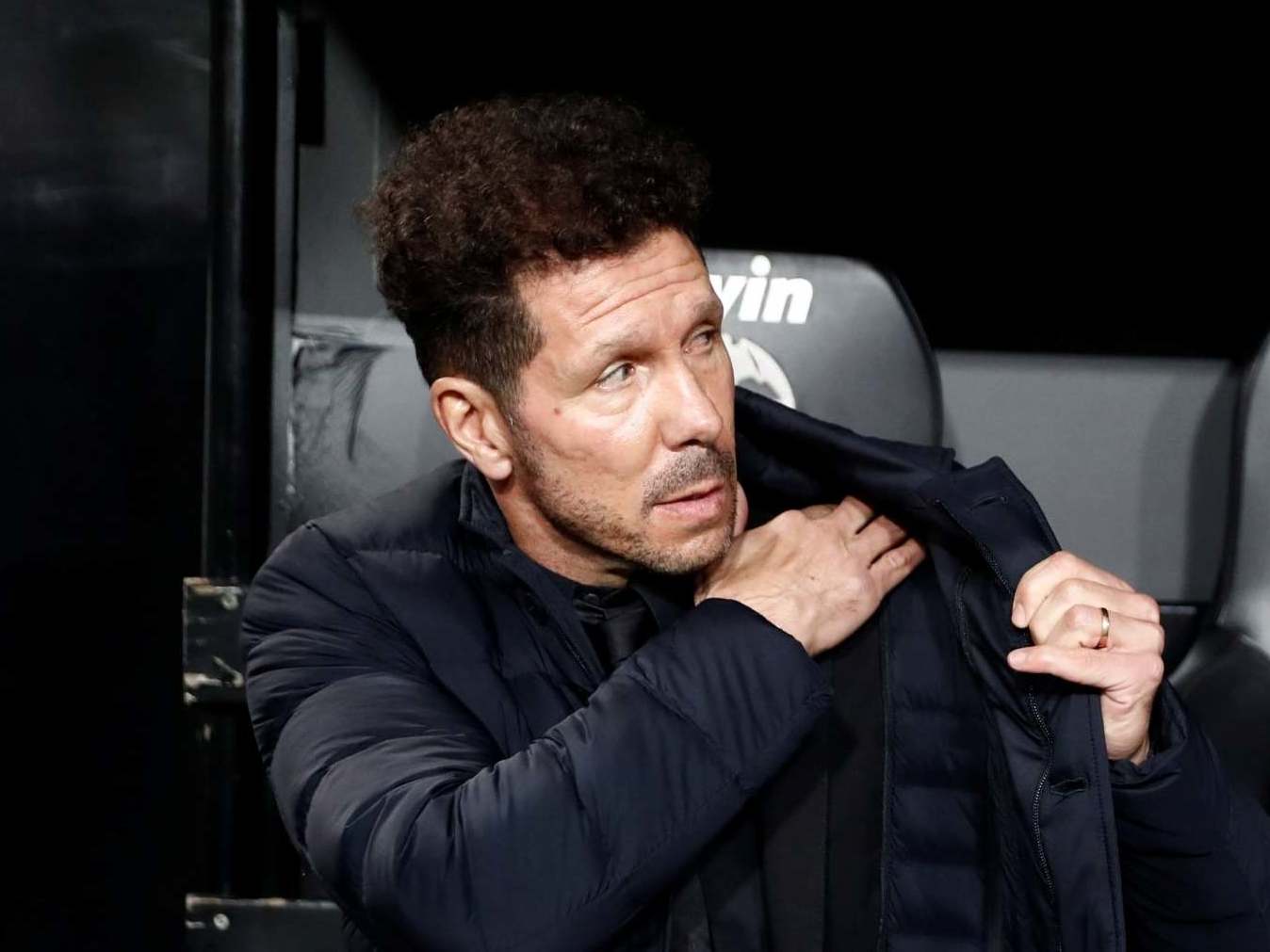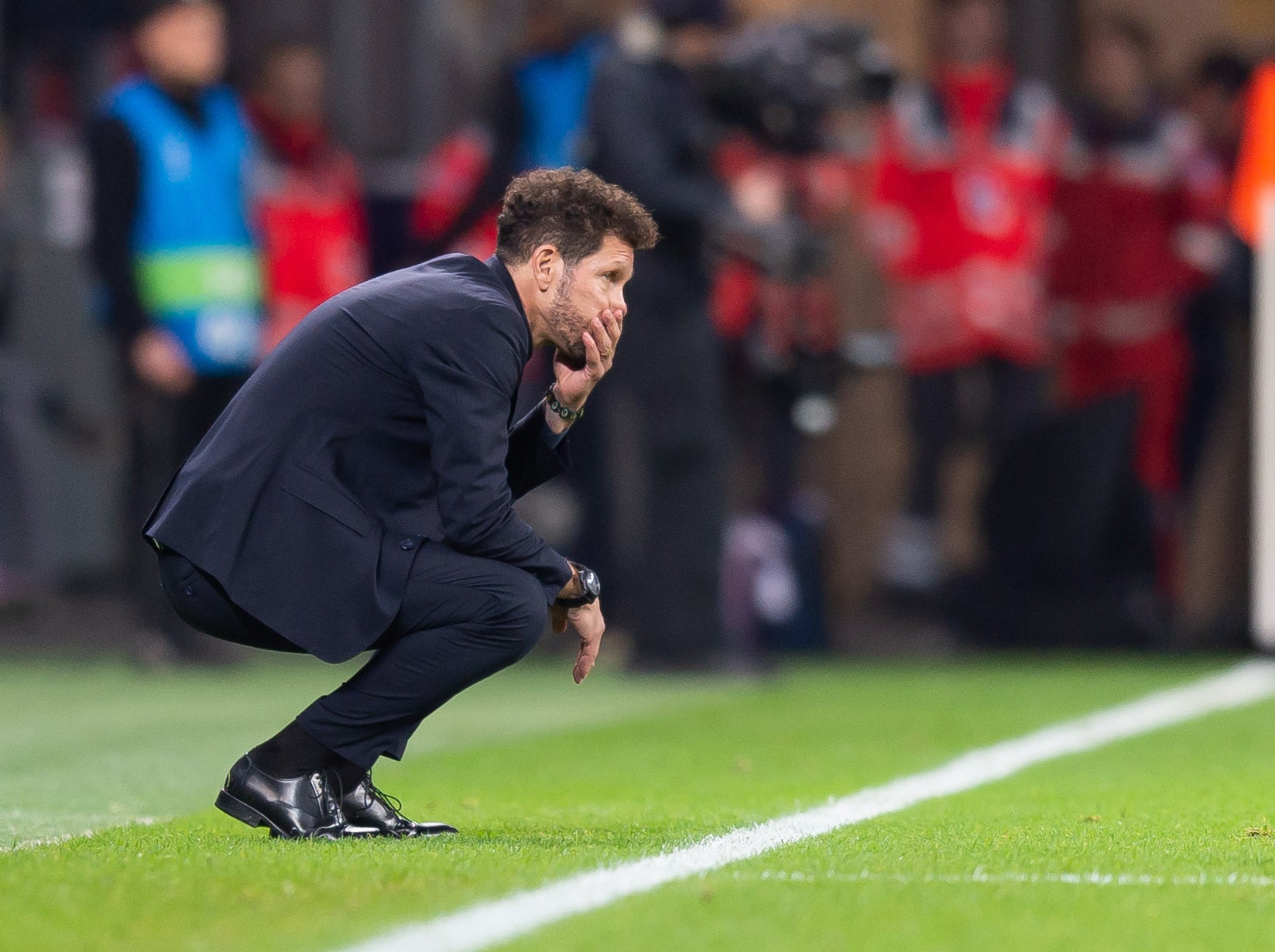Diego Simeone is Liverpool’s worst possible opponent at the best possible time
Atletico Madrid are still capable of raising it for any big game, but they are far from the force they were. Simeone’s time in the Spanish capital really may finally be drawing to an end

Your support helps us to tell the story
From reproductive rights to climate change to Big Tech, The Independent is on the ground when the story is developing. Whether it's investigating the financials of Elon Musk's pro-Trump PAC or producing our latest documentary, 'The A Word', which shines a light on the American women fighting for reproductive rights, we know how important it is to parse out the facts from the messaging.
At such a critical moment in US history, we need reporters on the ground. Your donation allows us to keep sending journalists to speak to both sides of the story.
The Independent is trusted by Americans across the entire political spectrum. And unlike many other quality news outlets, we choose not to lock Americans out of our reporting and analysis with paywalls. We believe quality journalism should be available to everyone, paid for by those who can afford it.
Your support makes all the difference.As Liverpool have ramped up over the last few weeks, Diego Simeone has knuckled down, spending hours watching their games in search of something very specific.
It isn’t so much a “weakness”, since there are so few in Jurgen Klopp’s team. It is something more abstract, that hints to a mindset that has been one of the key elements of Simeone’s success.
The Argentine has been searching for where the space is in between Liverpool’s attacking movement, and what areas especially need to be closed down to disrupt their whole system. This is how he sees the game, and how he defensively organises his team, getting them to target those areas in ravenous packs.
It is also why some who have worked with Simeone see a fundamental truth to his career. If you were to ask him whether he’d rather work out how to beat a club like Eibar 2-0 in any given league game, or figure out how to eliminate a side like Liverpool from one of the biggest Champions League ties, he would always take the latter.
This is why this draw represents such a particular danger for Klopp’s team – but also why this season has raised the danger that Simeone’s time at Atletico Madrid might finally be drawing to an end.
He is precisely the wrong manager for Liverpool to face, but maybe at exactly the right time. Atletico are still capable of raising it for any big game, but they are far from the force they were. There are growing questions about whether they can ever be the same force again under Simeone, and whether he is the same manager.
It’s been that pronounced.
That could be heard in how, during the recent 1-0 derby defeat to Real Madrid, the Bernabeu crowd were chanting “Cholo stay” – Spain’s equivalent of the opposition goading of “we want you to stay”.
Simeone does have a contract until 2022 but those close to the Atletico hierarchy are now saying “it’s not longer 100% he will be here next season”.
The Atletico crowd obviously do want the Argentine to stay, for he pretty much is the modern club, but there is a growing sense his departure wouldn’t be seen as the apocalypse of recent years. There isn’t quite the 100% unquestioning backing from the crowd any more.
There’s then the current squad. “They’re not the 110% group of the 2011-16 team,” one source says. They’re not the same breed of player, or generation. They don’t quite have the same evangelical beliefs in his methods, even if Simeone still holds such command.
There is similarly a sense that his very strengths may have stated to foster weaknesses.
The Argentine’s career has of course been built on the ferocity of his sides’ defending, and the forensic nature of his defensive tactics. It is how he furiously propelled himself from titles with Estudiantes and River Plate to Atletico.
“His brilliance is knowing how to reduce space, and to convince the players of his strategy,” Agustin Ayales has told The Independent.
Simeone was especially able to convince his initial squad at Atletico, that featured these “warriors” like Diego Godin, Gabi, Koke and Juanfran. They just fitted that sense of defiance, to then go and defy all modern football economics by winning the Spanish title and getting to two Champions League finals.
The first problem for Simeone has been replacing that initial group. It was just a perfect fit of manager and core squad, a chemistry you so often see with the great teams.
Something you also so often see in football, however, is the difficulty of replicating that chemistry at the same club. Very few managers in history have had one great title-winning team, and then broken it apart to build another at the same level.
Sir Alex Ferguson, Bob Paisley, Nereo Rocco and Arsene Wenger are among that few, with not many others.

Wenger, maybe just like Simeone now, encountered the Brian Clough issue. The same principles were able to build good teams – but no longer teams with that same conviction.
That’s all the more difficult when you are still trying to defy economics, as wealthier clubs just prise away your best players.
That is a problem of sustainability. You just can’t sign someone who immediately gets the role as well as Rodri, who went to Manchester City, or Antoine Griezmann, who went to Barcelona. That brings more inconsistency, while you compete against clubs with the financial power to barely suffer any inconsistency at all.
There has then been the added problem that there hasn’t been the same “buy-in” from new players. Some liken it to what Jose Mourinho has encountered in the last decade. Simeone’s approach, like the Portuguese’s, is best suited to those “warriors” from the last generation rather than the academy-insulated young players of this one.
Repeated sources say many of the new group are similarly unimpressed with the physical regime of fitness coach Oscar ‘Profe’ Ortega. They feel it as too brutal, and too rudimentary compared to the more position-specific approaches at other clubs. This is all the more pointed since it was Ortega’s regime, and the frenetic intensity it allowed, that was credited as so key to that first surge under Simeone.
It is now just being blamed for a spate of injuries, that have ravaged the club for the last 18 months. This is something that can’t be overlooked either.
Atletico have just had so many players out, only causing more ructions, and more inconsistency. They have most recently been missing pretty much all their forwards, with Joao Felix and Alvaro Morata out, and Simeone sweating on Diego Costa’s return for the Liverpool tie. This is one reason why they have only managed one goal a game this season.
It raises another bigger question related to approach, even more important than fitness. Are Simeone’s attacking tactics now just not as effective, too out of date as the game has evolved?
A bit like Mourinho, but in a more sophisticated way, Atletico are entirely built around counter-attacks and individual inspiration. So, when those necessary individuals aren’t there – like the strikers – there’s not much building at all. There’s certainly no construction of proactive moves. Some say it has had a particularly inhibitive effect on Felix.
This is why Atletico so struggle against inferior sides, especially in a football world that has seen attacking football and goal averages explode. The game’s tactics have taken huge leaps since even 2014, arguably faster than ever before.
So, Atletico suddenly look even staler. This is why fans wouldn’t be as distraught as a few years ago if they lost their £40m-a-year manager.
This, however, might still be what best suits playing Liverpool. There remains the feeling Simeone might be the only manager in the world capable of coming up with the approach that ends this run.
He can certainly still spot things other managers can’t – even if it isn’t currently looking as good for him.
Join our commenting forum
Join thought-provoking conversations, follow other Independent readers and see their replies
Comments